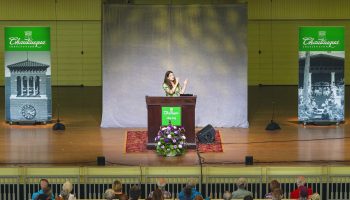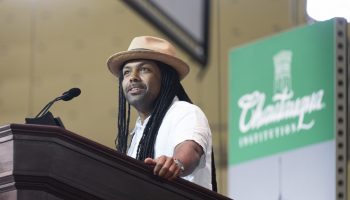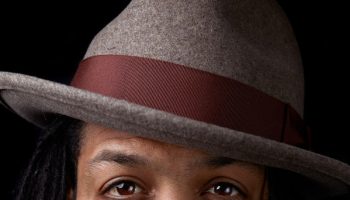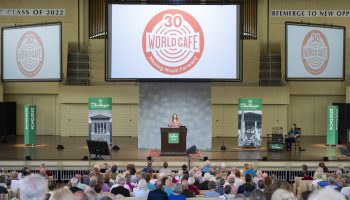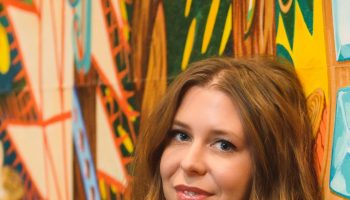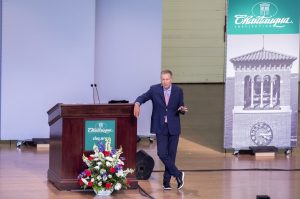
As a first-semester freshman at Ohio State University, John Kasich talked his way into the Oval Office. Coming up short in two presidential elections since then, Kasich would say he peaked at 18.
Kasich, former Ohio governor and current CNN political commentator, spoke at the 10:45 a.m. morning lecture Monday in the Amphitheater, opening Week Two, “Uncommon Ground: Communities Working Toward Solutions.”
Kasich grew up in Mckees Rocks, Pennsylvania, a town he called “rough and blue collar.” His father was a mailman, and his grandfather was a coal miner. His mother was a smart, but “undereducated woman” and his grandmother could barely speak English.
“It was the kind of place, for those of you who know Mckees Rocks and blue collar towns, if the wind blew the wrong way, people found themselves out of work,” Kasich said.
To break the cycle he watched growing up, Kasich made the decision to move away for college and ventured to Ohio State University in Columbus.
Right off the bat, Kasich said there were a number of things he did not approve of in his dorm building. Taking his uncle’s advice, “If you want to get somewhere, start at the top,” he called the president of the university and asked for a meeting.
After a lot of back-and-forth with the woman at the front desk, he eventually got in.
Kasich was impressed with the OSU president and his office. After expressing his concerns about campus residence halls, Kasich continued talking with the president to learn more about his job. The OSU president explained his day-to-day responsibilities, and mentioned an upcoming trip to see President Richard Nixon in Washington D.C.
“I said, ‘Sir, there are a number of things I’d like to talk to (Nixon) about also, could I come with you?’ ” he said.
OSU’s president said no, but agreed to let Kasich write a letter to pass along to Nixon. A couple weeks later, Kasich received a letter inviting him to the Oval Office. After convincing his parents the letter was legitimate, he flew to D.C.
Upon arriving at the White House, a man told Kasich he would have five minutes with Nixon.
“Let me tell you what I’m thinking: new jacket, new shirt, new tie, new pants — I didn’t come here for five lousy minutes,” Kasich said.
And he didn’t. Kasich spent 20 minutes with Nixon in the Oval Office.
“If you add up all of the time I’ve spent in the Oval Office as a nine-term congressman, I peaked out at the age of 18,” he said.
Despite this achievement early in his college career, Kasich ended up graduating without any connections for a job. Out of desperation, he inquired at the Ohio Statehouse and was offered an internship.
His boss was close with Ronald Reagan, who was just starting his campaign for president. During a convention in Kansas City, Kasich’s boss called and asked him to fly down and help. When he showed up, he was informed that the person who was supposed to run five states for Reagan didn’t show up and Kasich needed to take the position.
“I had no idea what that meant, and I said ‘No doubt about it, I can do it,’ ” he said.
Kasich went on to become the youngest state senator in Ohio’s history, served in Congress for 18 years and served two terms as Ohio’s governor.
Throughout his career, Kasich said he saw a shift in the way people express their political beliefs.
“We were in a place in this country where we were just fighting with one another about politics,” he said. “Now we are at the point where we just don’t want to bring it up; we’re walking on eggshells.”
When Kasich looks at the way people have been divided over political ideologies, he said he finds it “crazy,” because power comes from the people.
“It’s kind of crazy to me because frankly, power doesn’t flow from the top, down,” Kasich said. “Power in America flows from the bottom, up.”
Kasich often hears people refer to each congressional and presidential election as “the most important election we’ve ever had in our history.” Although he recognizes that the stakes are higher in presidential elections, he doesn’t agree with that mentality in either case.
“I maintain that on a day-to-day basis, I’m not affected much by that,” he said. “I’m not. I would make an argument that most of you are the same way.”
Instead of Washington politics, Kasich said what affects the lives of everyday Americans is what happens in their towns, with their neighbors, their families and schools.
“Those are things that affect us so much more than (national) politicians,” he said.
To emphasize the importance of individual efforts, Kasich called on an audience member in the front row and told her “there has never been anyone like you.”
“I want you to internalize that because you were made for a purpose,” Kasich said. “You were made for a legacy. Understand that we are all part of a mosaic.”
Comparing the concept to a puzzle with a missing piece, Kasich said people neglecting their purpose and special gifts leads to the mosaic being incomplete.
The broader topic encompassed in the mosaic is “figuring out the meaning of life.”
While people explore the art, music, culture and conversations Chautauqua has to offer, Kasich believes their time on the grounds is about something more.
“You know what it’s really about?” he said. “ ‘Who am I? What am I? What am I supposed to do?’ This isn’t some canned speech or canned lecture, this is why the Lord lets me do this, I believe.”
While exploring the meaning of life, Kasich said he is frustrated by people resisting getting older.
“This whole business about getting old? Get over it,” he said. “God doesn’t have a retirement plan for us. It’s not like we get to a certain point and we are supposed to stop. Are you kidding me? People, when they get older, have greater wisdom, can give better direction to people and we have to use it.”
Whether people derive life’s meaning from the teachings of Plato, Aristotle, Thomas Aquinas or John Locke, Kasich said they all agreed on one thing: “None of us are getting out of this place alive.”
“We are not here forever, so realizing that we have a gift, realizing that we have a responsibility to find those gifts and to use them in whatever way we can, means that we have a purpose and that we have to establish a legacy and we should not wait until the end,” he said.
Comparing the course of life to a touchdown in the last minute of a football game, Kasich said people often wonder what the players are waiting for the whole game.
“Let me ask you a question: Do you want to live a life where you are waiting for the last three minutes?” he said. “Why not get started today? Why not get rolling today? To lead an impactful life, to score some touchdowns and move the ball up and down the field?”
Meeting thousands of people in his political career, Kasich had numerous examples of ordinary citizens who didn’t wait.
He started with a story of a shoe shiner named Albert. One day, Albert heard an opportunity on the radio to help at a local children’s hospital. He took his life savings of $800 and donated it. Along with taking his donation, the hospital offered him a job shining shoes a couple days a week. Albert would put his shoe shining money in one pocket and his tip money in the other pocket to donate.
“Over the course of his service at the children’s hospital, he donated over $200,000 for a fund to help mothers and fathers pay the bills of their kids,” Kasich said. “Did Albert change the world? Yes, he did. Wouldn’t we all like to be Albert today?”
When Kasich was governor, he would give out courage awards to honor someone “who did something special.” His youngest honoree was a 9-year-old boy. The boy had grown up in homeless shelters until he moved in with his grandmother. She knew he wanted an Xbox and decided to tell him he would be getting one for Christmas. Instead of agreeing to accept it, he asked that she use the money to buy blankets for people living in homeless shelters.
“They bought the blankets, and people from all over were sending blankets to the homeless shelter,” he said. “What a kid, huh?”
Kasich said everyone he used as an example shared the knowledge that there was more to the world than just them.
“None of them were victims, none of them were ever bitter, and they knew they could overcome the obstacles in their way to achieve something,” he said. “Well, what they were really doing, is they were living a life a little bigger than ourselves.”
To broaden their perspectives on the world they are trying to change, Kasich said people need to make the effort.
“I have people say to me ‘I don’t even know what to believe,’ ” he said. “It’s not that hard. Research, do a little work. When you go to buy a car, you don’t look in the parking lot and say ‘OK, what do you have here?’ and the guy says ‘This is the greatest car ever’ and so you go and buy it?”
Kasich said rather than buying a car on the spot, one shops around first.
“So why don’t we shop around for what we believe?” Kasich asked.
People also need to stop refusing to consider other points of view, according to Kasich.
“You don’t have to agree with it, but stop walking away from it,” he said.
Attempting to make change, Kasich said, is often “walking a lonely road.”
“Martin Luther King — how do you think it went for him?” he said. “We all know Martin Luther King, but at that time, no one knew him, he was just some preacher down south. It killed him. They assassinated him for what he thought.”
Additional examples ranging from Rosa Parks, to Fannie Hamer, to the Parkland students and Greta Thunberg, Kasich proved his point that being disparaged can come with the territory of standing up for what one believes. Although it makes him angry, he believes it is important to consider the “misguided nature of the people who are doing the attacking.”
“One of the things I have found in my lifetime is if I can put myself in other people’s shoes, there are times when I can soften my opinion or soften my judgment,” he said. “But there are times when I’m just flat-out angry.”
Knowing polarization will rise again with the 2020 election, Kasich encouraged the audience to focus on what they can do in their communities to make a difference.
“I am going to wring my hands a little bit, but then I am going to try to figure out what I can do to be as impactful as I can be in my day-to-day life,” he said. “You see, in the great effort to repel the negativity and the division, power comes from the bottom, up. I mean think about it: the Civil Rights Movement didn’t come from the top, down. John Kennedy wanted nothing to do with the Civil Rights Movement.”
To conclude his lecture, Kasich said if only a few people heard his message and chose to make a difference in their minds, hearts or communities, it would have been worth it.

